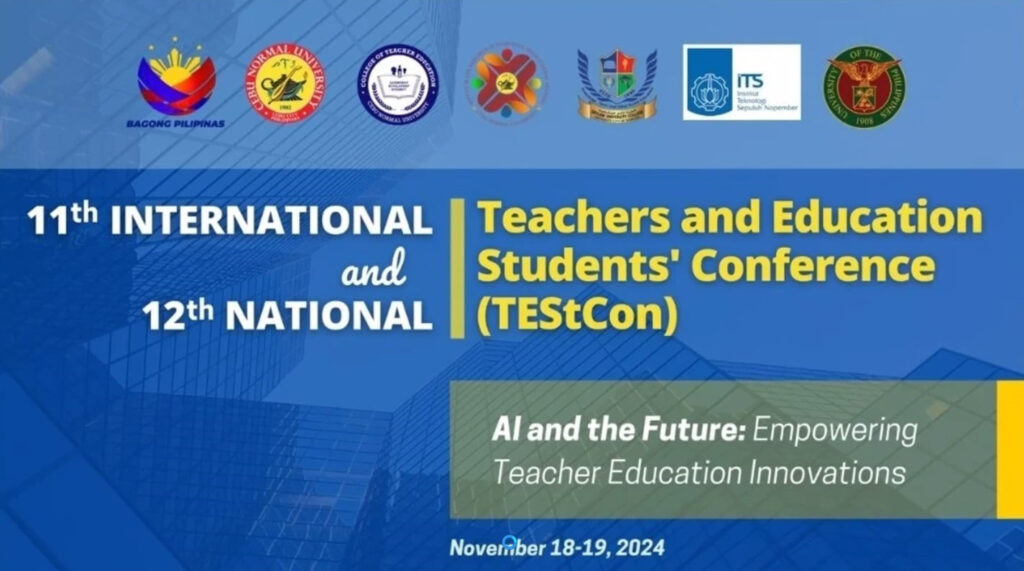The Caraga State University Cabadbaran Campus (CSUCC) participated in the 11th International and 12th National Teachers and Education Students’ Conference (TESTCON), held virtually on November 18-19, 2024. This prestigious event brought together educators, researchers, and students from various fields of education to explore and discuss innovative research and practices shaping the future of teaching and learning.
TESTCON, an annual gathering, serves as a dynamic platform for sharing cutting-edge research, fostering professional development, and facilitating collaboration among education practitioners. This year’s conference featured a diverse array of compelling studies, each highlighting unique approaches to educational development and reform.
The participants from CSUCC were primarily from the College of Industrial Technology and Teacher Education, who actively engaged in the conference through Zoom, contributing to the dialogue and gaining valuable insights from experts and peers across the globe. The event proved to be an enriching experience for all involved, offering a glimpse into the future of education and the evolving roles of educators and students in shaping it.
Below are three of the standout research papers that were presented:
Bridging Theory and Practice: Instructional Material Development for Agri-Fisheries Anchored in the Rosenshine Model
Presenter: Sannie O. Monoy, Jr.
Researchers: Sannie O. Monoy, Jr., Xyra Mea E. Tabolinar, Shaira S. Sarsaba
Adviser: Mr. John O. Estillore
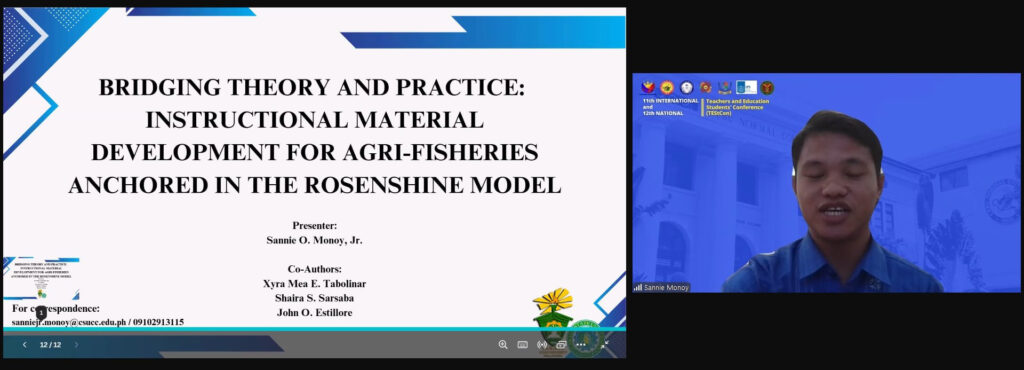
This study explored the development of instructional materials for the field of Agri-Fisheries Education, grounded in the principles of the Rosenshine Model. The Rosenshine Model emphasizes research-based strategies for effective teaching, such as explicit teaching, active student engagement, and systematic feedback. By incorporating these principles, the research team aimed to create materials that not only align with the practical needs of students but also provide a strong theoretical foundation for instructors in Agri-Fisheries education. The focus of this research was to ensure that these instructional materials bridge the gap between theoretical knowledge and practical application, thereby enhancing students’ learning outcomes in the agricultural and fisheries sectors.
Beyond the Textbook: Unveiling the Perceived Multiple Intelligences of Caraga State University Teacher Education Students
Presenter: Anna Flor B. Alperez
Researchers: Heart Xyriel Candie Timbang, Christine H. Aballe, Anna Flor B. Alperez
Adviser: Mr. John O. Estillore
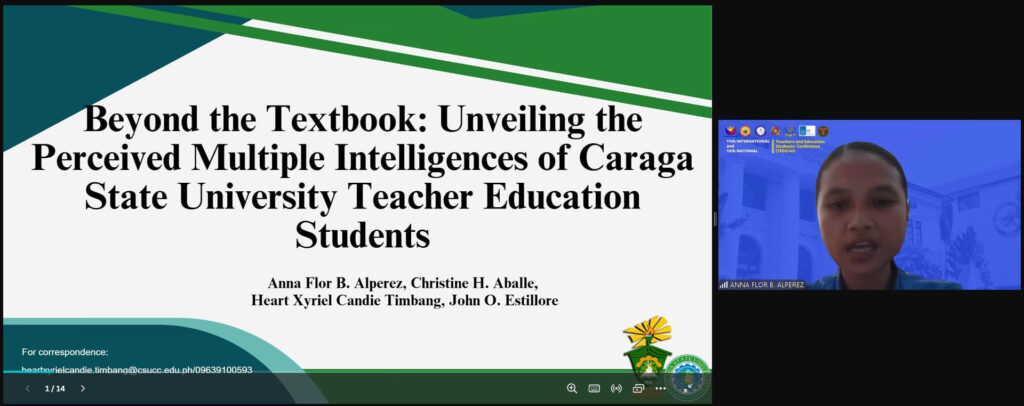
This research focused on understanding the multiple intelligences of Teacher Education students at Caraga State University. Building on Howard Gardner’s theory of multiple intelligences, which posits that intelligence is not a singular entity but a variety of distinct capabilities, this study aimed to uncover how these different intelligences were perceived and utilized by future educators. By analyzing the unique strengths and preferences of students, the researchers sought to demonstrate how educators can better cater to the diverse learning styles and intellectual strengths of their students. The results have significant implications for teacher preparation programs, as they highlight the importance of a more personalized and adaptive approach to teaching.
Exploring the Use of Generative AI for Immersive and Interactive Learning Experiences in Technology Education
Presenter: Ma. Eunila A. Milay
Researchers: Ma. Eunila A. Milay, Arfunzelle Shainee Miole, Jessie G. Cabalan Jr.
Adviser: Dr. Ritchfildjay L. Mariscal
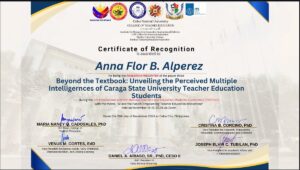
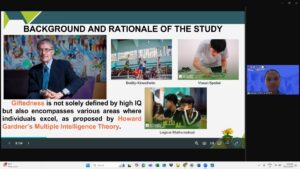
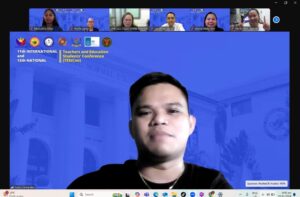
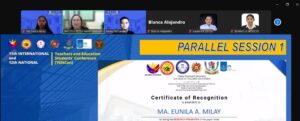
Presenter: Ma. Eunila A. Milay
Researchers: Ma. Eunila A. Milay, Arfunzelle Shainee Miole, Jessie G. Cabalan Jr.
Adviser: Dr. Ritchfildjay L. Mariscal
This innovative research presented an exploration into the use of generative AI to enhance learning experiences in technology education. The rapid advancement of artificial intelligence, particularly generative AI, is transforming how students interact with content, learn, and engage in creative problem-solving. The researchers explored how AI technologies can be integrated into technology education to offer immersive and interactive learning experiences, with a focus on fostering critical thinking and hands-on skills. By using generative AI tools, students can simulate real-world scenarios, create prototypes, and receive instant feedback, enabling them to deepen their understanding of complex technological concepts. This research shows how AI can reshape classrooms and provide educators with new tools to support and enhance student learning.
DESIGN AND DEVELOPMENT OF WEB-BASED LEARNING MATERIALS IN ELECTRICAL WIRING, SIGNAL AND COMMUNICATION SYSTEM FOR BTVTED ELECTRICAL TECHNOLOGY
Presenters and Researchers: Keddy S. Nakila; Madonna T. Emboy; Jay B. Malano; Marwynn Paul M.Herda
Co-author and Adviser: John O. Estillore Caraga State University Cabadbaran City
Abstract: This study aimed to design and develop web-based learning material for Electrical Wiring, Design, Signal, and Communication System for the BTVTED Electrical Technology, by integrating a web-based technology tool in instructional development for an advanced and flexible teaching pedagogy. The study utilizes a developmental type of research following the modified Analysis, Design, Develop, and Evaluate (ADDE) model of instructional development. The peer-to-peer evaluation obtained a mean of 3.39, a standard deviation of 0.25, and a High Evidence remarks. For summative evaluation, five (5) expert evaluators evaluated the demonstrational videos using the Multimedia Evaluation Checklist (MEVAC) with a mean of 3.59, a standard deviation of 0.11, and a Very Satisfactory remark. Furthermore, the evaluators also evaluated the web-based learning material using the Instructional Material Evaluation Checklist (IMEC) which obtained an overall mean of 3.29, a standard deviation of 0.11, with an Enough Evidence remark. The Product Quality Assessment (ISO/IEC 20510), on the other hand, obtained an average mean of 3.44, a standard deviation of 0.09, and an indicating remark of Always. The data suggests that the researchers must focus on improving their web-based learning material, especially for parameters with lower mean. Keywords: Web-based Learning Material, Online Module, Electrical Wiring
GLOWING BRIGHTER”: THE STORY OF UNVEILING ESSENTIAL NEEDS OF POTENTIALLY GIFTED LEARNERS AND LEARNERS WITH DISABILITIES IN MINDANAO HIGHER EDUCATION
By: John O. Estillore, Dr. Ramil B. Arante
Caraga State University Cabadbaran City
Abstract
This qualitative research explores the essential needs of potentially gifted learners and learners with disabilities in one of the higher education institutions in Mindanao, Philippines. Through an analysis of
online surveys, individual interviews, and teachers’ recommendations, eight key themes were identified:
curriculum development integration, accessibility and support, inclusivity and fairness, adaptive
institutional environment, network support systems, financial support, infrastructure and facilities support, and mental health support. Findings highlight the importance of individualized learning approaches, comprehensive support services, accessible environments, and a culture of inclusivity. it is also seen that potentially gifted and learners with disabilities has identified different needs. Hence, by addressing these needs, higher education institutions can create a more equitable and supportive learning environment that empowers all students to reach their full potential.
Keywords: Potentially Gifted, Learners with Disabilities
Conclusion
The presentations at the 11th International and 12th National Teachers and Education Students’ Conference highlighted the transformative potential of research-driven educational practices. From bridging theoretical models with practical learning tools in Agri-Fisheries education, to exploring the use of generative AI for immersive learning experiences, these studies reflect the dynamic, innovative approaches shaping the future of education. With the contributions of passionate researchers, educators, and students, TESTCON 2024 not only celebrated educational research but also encouraged collaboration, critical thinking, and the continuous pursuit of excellence in teaching and learning.



